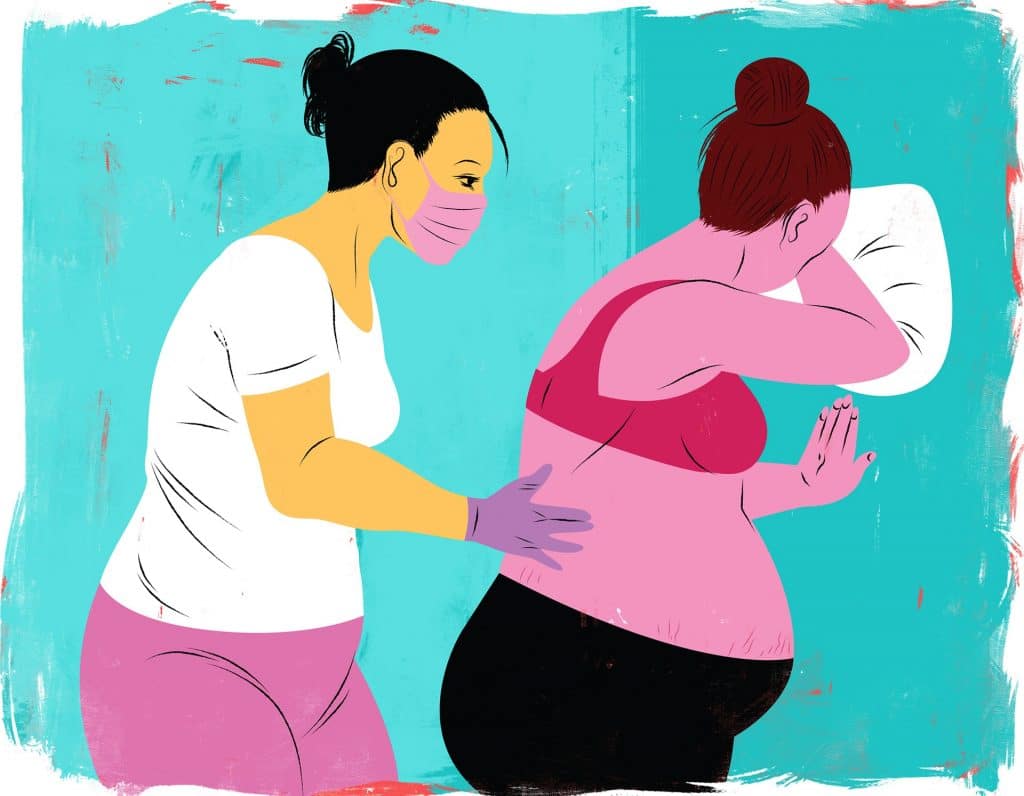Doulas (from the Greek word meaning “women’s servant”) have become increasingly visible in prenatal, delivery and postpartum care in recent years, and I am all for it! Doulas provide vital non-clinical emotional, physical and educational guidance for women during pregnancy, labor (coaching and birthing support) and also importantly during the postpartum time. In many hospitals and birthing centers, doulas are an important addition to the team, along with doctors and nurses, for pregnant women. I’ve found doulas who work with my pregnant ladies to also be very helpful as allies and advocates for my patients and their families, and with everything going on these days and during pregnancy, we can all benefit from another ally…
Many doulas are lay women (and occasionally men) who, based on their initial experiences helping a family member in labor, develop a love for the process and the ability to serve at a vital time in a woman’s life. A growing number of doulas today are also getting trained and certified to provide more standardized care. As the country works to try to decrease maternal mortality rates and racial/ethnic disparities, doulas can help facilitate communication regarding any noted elevated blood pressures, diabetes, and post-delivery care issues (postpartum depression, wound healing, increased pain, heavy bleeding) that may warrant heightened attention by the OB care team; all with the ultimate goal of a healthy pregnancy experience for women.
“A skilled doula empowers a woman to communicate her needs and perceptions and actualize her dream of a healthy, positive birth experience.”1
This is usually the point where my patients might ask, “That’s nice, but how much does it cost?” Well, costs for doulas vary by region of the country and income of the women being served. Although some doulas cost an average of $1,000 and are often not covered by insurance, many doulas make exceptions for women whose income may not allow them to pay for their services. This is especially important for women who have low incomes, for whom doulas sometimes work as volunteers to help improve the odds of a healthy birth. But volunteering is often not sustainable long-term for doulas who may also need to earn an income to sustain themselves and their families. There are currently pilot programs exploring Medicaid reimbursement for doula support as one way to ensure payment for doulas for women who otherwise could not afford to hire a doula.2
Although doulas have been around for centuries, they are being increasingly sought after as birthing team members, especially as we work to reduce the maternal mortality crisis for women of color in the U.S. Even though most pregnancy-related deaths are preventable, Black, American Indian, and Alaska Native women are two to three times more likely to die from pregnancy-related causes than white women.3 Some doulas report that they witness the way women often receive different standards of care depending on their race, their insurance, and their location.4 Many doulas are then moved to volunteer to help level the playing field, advocate for their pregnant clients and decrease pregnancy risks as they navigate their birth experiences. Many doulas are also historically underrepresented women of color.
“It’s important to have the option of a provider who looks like you, who speaks your language, who understands things that another provider might not. Some of our clients go on to become doulas themselves because they see the impact we have. They felt valued and supported during this special, sacred time, and in turn wanted to do the same thing for others. That’s the best reward.”4
Doula care can help reduce health disparities by being strong allies and advocates for pregnant women, especially women of color, who have needs for additional social and structural support, including those with lower incomes, less preparation for childbirth and those lacking employment, housing or food stability. Research shows that doula support results in reduced negative birth experiences, reduced cesarean rates, shorter labor, higher rates of breastfeeding, and fewer preterm births.
Supporting women in pregnancy and labor is a team effort. Those who can provide extra support and guidance for women in labor are a beautiful thing. The maternal mortality-related health disparities in this country are unacceptable, and to solve this problem warrants an all-hands-on-deck approach. As a board-certified OB/GYN, I don’t see doulas as our competition. Ideally, we all want the same thing—positive and healthy outcomes for our pregnant ladies. Outcomes for women, especially women of color, are better when we all work together, as allies and advocates for our patients. So with our patients/clients in mind, let’s figure out how we serve women together, toward healthier pregnancies and babies. We can, and we must do this!
References
- Gruber KJ, Cupito SH, Dobson CF. Impact of doulas on healthy birth outcomes. J Perinat Educ. 2013;22(1):49–58. doi:10.1891/1058-1243.22.1.49.
- Bey A, Brill A, Porchia-Albert C, Gradilla M, Strauss N. Advancing birth justice: Community-based doula models as a standard of care for ending racial disparities. Available at: https://everymothercounts.org/wp-content/uploads/2019/03/Advancing-Birth-Justice-CBD-Models-as-Std-of-Care-3-25-19.pdf. Accessed March 26, 2020.
- Petersen EE, Davis NL, Goodman D, et al. Racial/Ethnic Disparities in Pregnancy-Related Deaths — United States, 2007–2016. MMWR Morb Mortal Wkly Rep 2019;68:762–765. DOI: http://dx.doi.org/10.15585/mmwr.mm6835a3.
- Bobrow E. “What It’s Like to Be a Doula for Women of Color” https://www.thecut.com/2018/08/what-its-like-to-be-a-doula-for-women-of-color.html.

